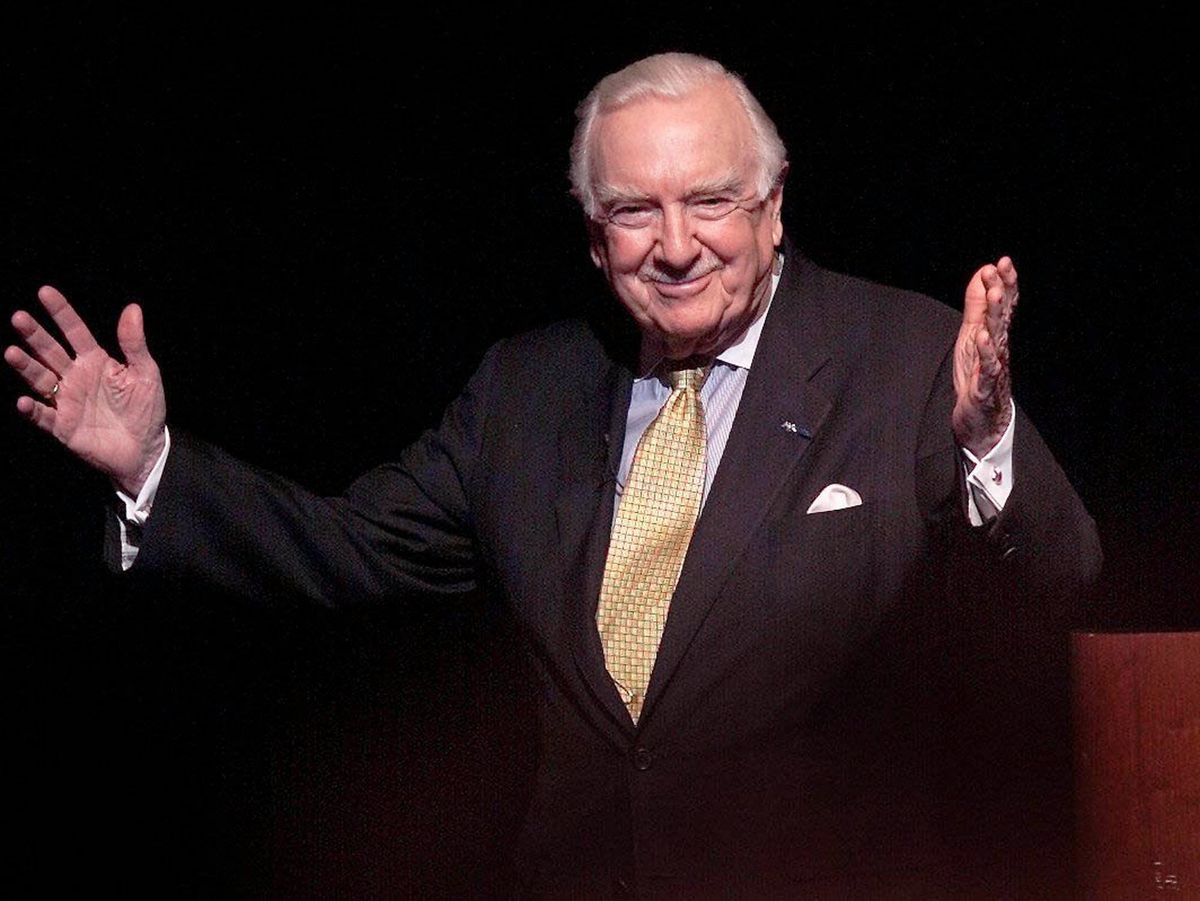Trusted icon dies at 92
Cronkite put history in plain words

MIAMI – Walter Cronkite, the television news anchor who became the most trusted man in America after holding the nation’s hand through a presidential assassination, advising it to quit an unpopular war and leading its cheers during a moon landing, died Friday at age 92.
Cronkite came to literally define the term news anchor during 31 years at CBS News. In Sweden, TV anchors are called Kronkiters; in the Netherlands, Cronkiters.
Cronkite’s calm, sonorous baritone and grave but kindly face were constant companions to Americans during nearly every moment of crisis, joy or grief through the turbulent three decades following World War II. In the old three-channel television world before cable, Cronkite had more viewers than all of today’s evening newscasts combined.
“I can’t tell you, or describe, what it was Cronkite had, any more than I can tell you what Clark Gable or Cary Grant had,” said Don Hewitt, the CBS producer who created “60 Minutes” and worked 17 years on the “CBS Evening News” program. “They just were.”
His audience was so vast, and identified with him so completely, that when Cronkite denounced the Vietnam War in a landmark broadcast in 1968, President Lyndon Johnson turned mournfully to his aides and said, “If I’ve lost Cronkite, I’ve lost Middle America.” Within days, Johnson gave up his bid for re-election and launched negotiations to end the war.
Cronkite’s declaration that it was time to get out of Vietnam, like his other signature moments – wiping away a tear as he announced the 1963 death of President Kennedy at the hands of an assassin, exuberantly shouting “Go, baby, go!” as the rocket carrying the first men to the moon lifted off in 1969 – created such impact because they clashed so dramatically with his usual just-the-facts style.
A wire service reporter – he covered World War II for the old United Press – before he joined CBS, Cronkite stuck with the same style for television: simple prose, spoken slowly (a self-trained 124 words a minute, compared to 165 for the average American), and delivered without affectation or opinion. “Fast, accurate and unbiased” was his broadcast motto.
Viewers credulously embraced him – two polls, one of them 15 years after he left the air, named him the most trusted man in America – and a generation of TV reporters were awed by him.
Fox News anchor Chris Wallace, who has dodged Iraqi missiles in Tel Aviv and shouted at presidents in Washington during his nearly four decades in TV news, said nothing has ever compared to the thrill of the first time Cronkite introduced one of his stories on the CBS Evening News.
“I was watching at the CBS affiliate Chicago,” Wallace remembered. “And when Cronkite said, ‘and Chris Wallace in Springfield, Illinois,’ there was a big cheer from the newsroom. I felt like I had died and gone to heaven.”
Born in Missouri and raised in Houston, Cronkite became fascinated with journalism in high school and dropped out of the University of Texas to pursue his career. For several years he bounced between newspaper, radio and wire service jobs throughout the Midwest, not always with momentous results. One of his most memorable interviews, he later said, was with Hinda Wassau, the burlesque star who invented the stripper pole.
When Cronkite, desperately searching for something he could get into family-friendly newspapers, asked her about the role of burlesque in boosting wartime morale, Wassau grabbed him by the lapels of his jacket. “Let me tell you something,” she snarled at the shaken Cronkite. “The morals behind a burlesque stage are just as good as the morals at Radio City.”
Covering Hitler and the Nazis proved less problematic. Cronkite’s combat reporting from Europe – he flew along on bombing missions over Germany, waded ashore on D-Day, and dropped into the Netherlands with American paratroopers – made him a rising star at United Press, and he took over as the wire service’s Moscow bureau chief.
In 1950, Cronkite was offered a job at CBS, which was having trouble persuading its veteran radio correspondents to switch over to the network’s fledgling television new operation. Cronkite began doing nightly analysis of the Korean war on the CBS Washington affiliate and instantly caught the attention of CBS News boss Frank Stanton and network chairman William S. Paley.
“Guys like Stanton and Paley took one look at Cronkite and knew he was the future of CBS News,” Hewitt said.